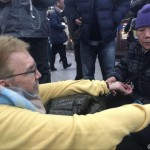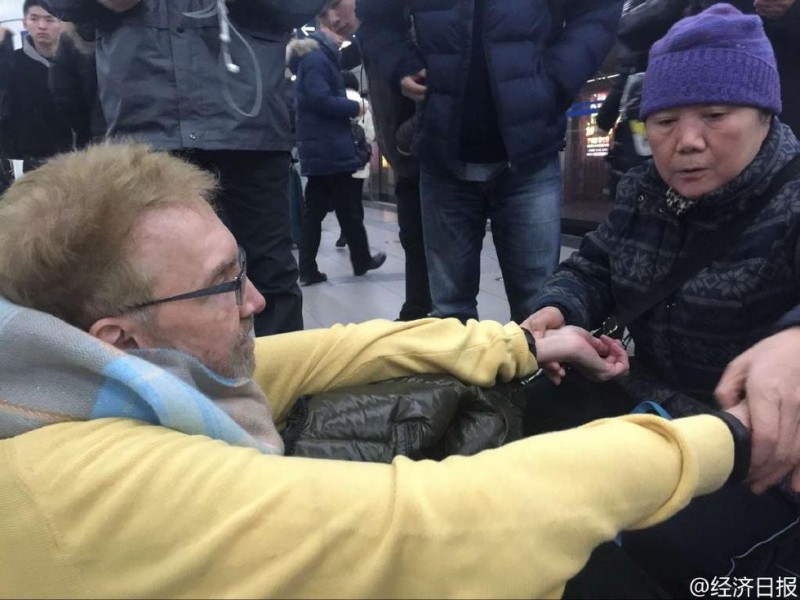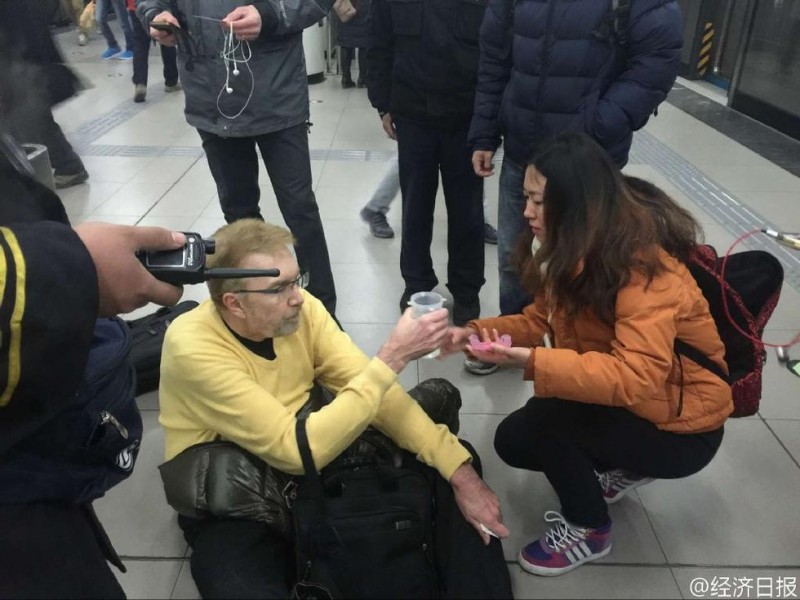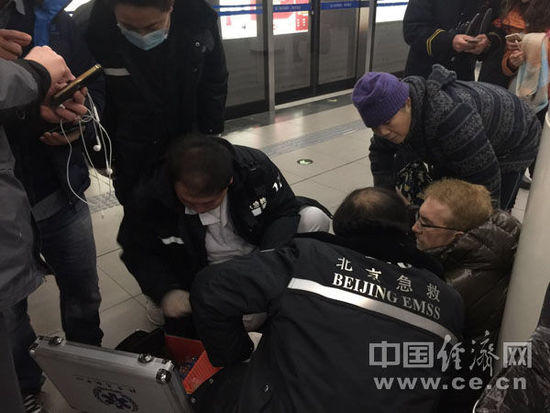
The phenomenon of people appearing to be victims on the street, only to accuse those trying to help them in fraudulent claims, has been an ongoing topic in Chinese society. After several high profile cases, now many Chinese people stay away even if somebody appears to be in distress for fear of being taken advantage of.
But when the fallen victim turns out to be a non-Chinese person, the rules suddenly change. Instead of rushing to turn the other way, Chinese are seen rushing to help. That’s what happened in a widely-reported incident that took place on the Beijing Metro, which triggered some soul searching in China about why they are willing to help foreigners but not Chinese people.
An unidentified expat in his 50s unexpectedly collapsed at Taiyanggong Station on Line 10 yesterday, right after the morning rush hour. Numerous Chinese commuters are seen immediately coming to the aid of the fallen victim in photos published online.
One woman is seen reporting the incident to emergency services, and is seen comforting the victim with a cup of water, another man offered his winter jacket to cover the prone man, and a middle-aged woman is seen using her knowledge of traditional Chinese medicine (TCM) to massage acupuncture points in his arms to improve his circulation.
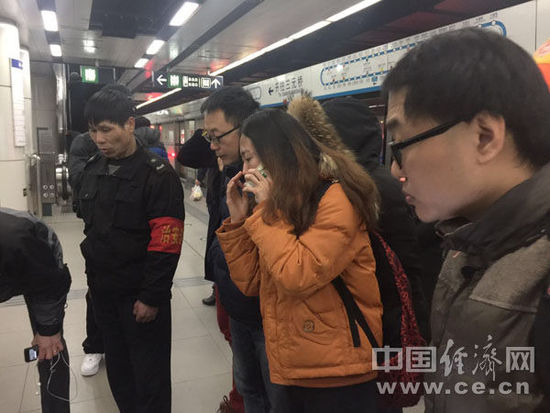
Sheng Zhaorui, the station manager on duty, was especially impressed with the use of TCM. Sheng had arrived soon after the foreigner had collapsed, noting how cold his hands were as he tried to help him get up. “As I watched (the auntie do the acupuncture massage), I didn’t think that after a few minutes his cold hands would immediately warm up,” said Sheng.
Emergency services are said to have arrived within five minutes of the incident first happening, and the man was sent to the Sino-Japan Friendship Hospital just ten minutes later.
Soul searching and double standards
While it seems like the man will recover, it seems like China at large has been more banged up over the whole affair. The attention the foreigner received, both from bystanders and the media, has prompted wide-scale soul searching over why Chinese people don’t trust each other but have no qualms towards rushing to help a stranger from another land.
The Global Times wrote this as their introduction to the story:
If (a Chinese person) were to fall down on the street, other (Chinese) pedestrians are likely to try to avoid the situation for fear of getting scammed, a common thing ever since defrauders and “broken vase” tricksters have corrupted the current way of doing things in Chinese society. However, when a foreigner on the Beijing Metro recently fell down when he wasn’t careful, the public acted completely out of character and did things they don’t normally do. Rather, they competed with each other to be the first to help this person (instead of running away). What does this prove? Does this mean that foreigners are incapable of extortion (in China)? Are foreigners simply more honest than Chinese?
By just falling down in a public place, this expat had inadvertently exposed a double standard that many Chinese are loathe to admit.
Chinese netizens pointed out they live in a society where civility is constantly at odds with opportunism. One person wrote, “If it was an average person like an old auntie (who fell down), who would dare help her up? China doesn’t lack good-hearted people, but instead victims who have a proper sense of the difference between right and wrong.” Meanwhile, another person admitted, “We’re all willing to help out and extend a hand. It’s just that we won’t do it in China.”
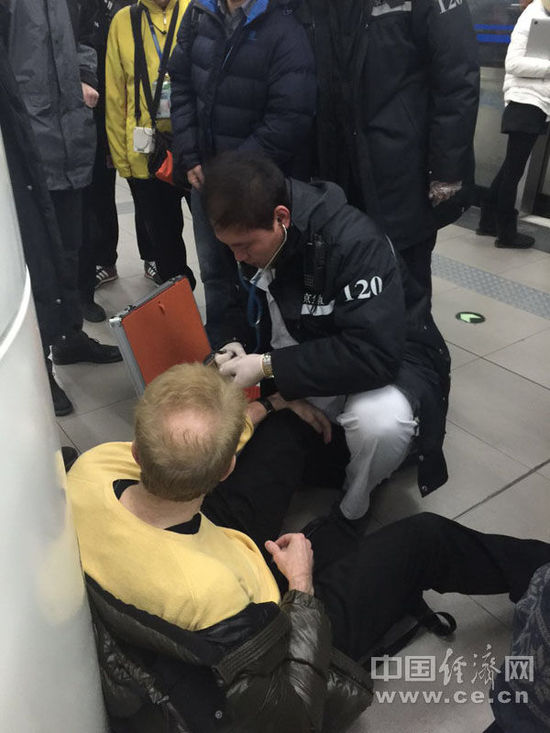
Others were appalled at the double standard on display. One person wrote, “So, if it was a Chinese person that was being helped up, then that wouldn’t be news?” Another was upset that this story received such wide news coverage, saying, “Previously when taking the subway, a middle-aged man fainted, to which a bunch of people went to see if he was alright. So please, don’t write ‘foreign man’, ‘all striving to be the first to help him up’ just to attract attention and get clicks! This is in fact a normal occurrence, but when reported by the media, the message gets twisted around!!!”
But it wasn’t all outrage as some people took time to enjoy the humor of the situation. One person said, “Perhaps most Chinese would look at this situation and go, ‘Finally! A chance to put my years of studying English to use: Hello, how are you? I’m fine, thank you!” while another joked, “Relax, no need to worry. It (the laowai) is imported.”
And to answer the question posed by the Global Times, the netizen who wrote a top-rated comment said, “Chinese people are all thinking the same thing: This laowai won’t possibly scam me.”
Prior precedents
Many Chinese refer to a famous Nanjing case as the prime example for why you can’t help out other people in China. In the 2006 case, a man named Peng Yu was convicted of pushing an elderly woman down after he went to help her up. However, the irony of citing this case as a precedent has become clear ever since Peng has since admitted to his guilt.
In the opposite direction, the apathy to which Chinese will extend towards each other came to its lowest point in 2011 with the Wang Yue incident. Some eighteen pedestrians walked around the toddler’s prone body after she was run over by a car instead of offering help or alerting police, leaving her to die.
Related:
- With nobody offering help, passed out woman dies amid crowds at Shenzhen subway station
- 81 year-old woman knocked down in Guangzhou, bystanders ignore her
- Fight over subway seat in Guangzhou leads to bloodshed, passengers just watch
- With nobody offering help, passed out woman dies amid crowds at Shenzhen subway station



